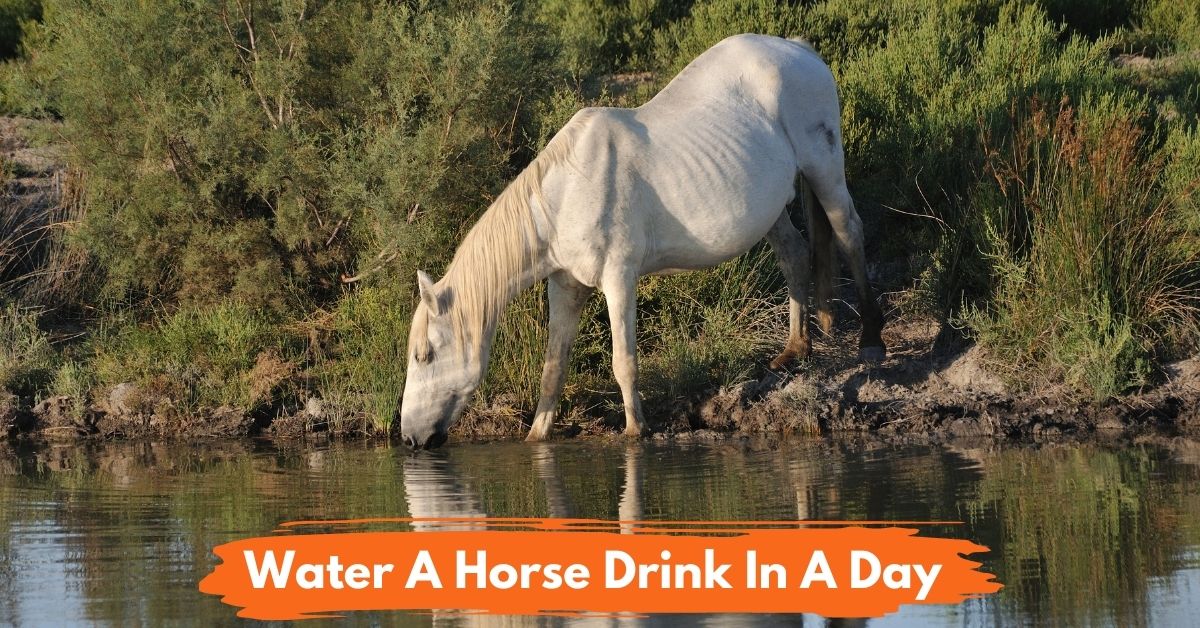
A horse drinks 5 to 10 gallons of water a day. Apart from proper nutrition, water is essential for the equines. It’s an element that prevents dehydration, colic, and even death.
Like humans, water is important to the digestion process of an equine. So, I fear the consequences when the horse refuses to drink within 48 hours.
Researching and asking a vet helped me to know everything that I needed to know about this concern. You’re in luck, as you can save time and effort. I summed up all the details that every horse owner should be aware of about the water needs of horses.
Can horses drink river water? Can they get water from what they eat? You’ll find the answers here and more!
Why is Water Important?
If you think about it, horses lose water on many occasions. It happens when they sweat, urinate, defecate, and during respiration. A broodmare also needs water when lactating.
Not only can horses lose water in several ways. There are many reasons why water is important for them. Water is an indispensable aid in digestion. It helps the absorption of nutrients as well as their usage and transport within an equine’s body.
The water that horses drink regulates their body temperature. Without it, horses won’t be able to defecate.
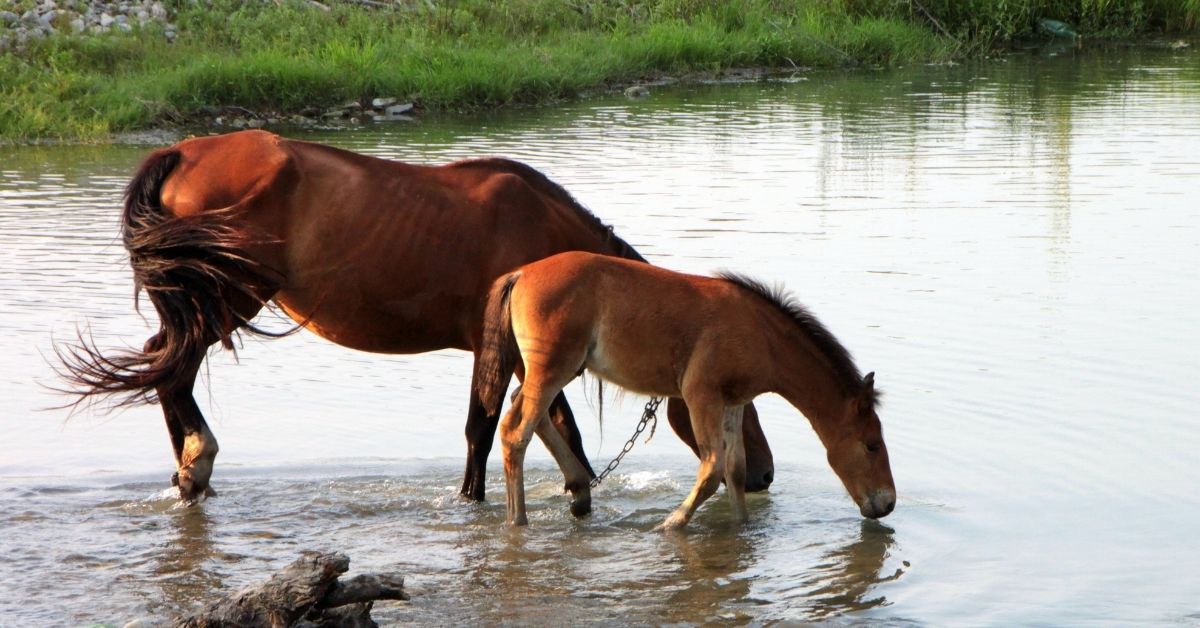
How Many Gallons of Water Does a Horse Drink a Day?
In particular, a 1000-lb horse drinks 10 gallons of water a day. You can fulfill this by serving the animal 5 gallons of water twice a day. As mentioned, horses can drink 5 to 10 gallons.
There are variations as some factors brought the changes. Discussions about them are in the latter part.
Factors That Can Affect The Consumption of Water
As mentioned, a horse can consume 5 to 10 gallons of water daily. The amount varies because of the following factors.
Moisture From the Grass and Plants
Horses out in the pasture can get 70% to 75% moisture from the grass they eat. Imagine the big difference from the 10% moisture that hay contains!
So, paddocked horses that graze in the pasture can get more water than the working ponies feed on grains and hay. Even if your horses graze outdoors, you must provide at least 10 gallons of water daily. But horses that eat hay should drink more water.
The grass in the pasture does not contain the same moisture all year round. Be particular about seasonal change. Since the pasture is dry in the summer, there’s a decline in the moisture content of the grass.
You can expect a high level of moisture during spring and the end of winter. In this period, horses have loose manure due to the high moisture or water intake.
Temperature and Activities
Like humans, horses love to drink water when the weather is hot and humid. But the required amount of water stays the same when winter comes. There are reasons why dehydration likely happens in the hot season.
In summer, horses engage in shows, trail riding, pleasure riding, and work on farms or ranches. They lie low in doing these things in winter.
But you have to know why respiratory water losses occur. The reasons behind it are high temperature and strenuous activity. For instance, a cross-country horse loses 50 to 75 pounds of water after a long competition.
There’s an increase in respiration rate among horses to cool them down. Another reason is the heightened demand for oxygen for muscle tissue.
On the brighter side, the equine bodies can be more efficient in heat dissipation. Horses regulate water losses through adaptation to the environment and training. But it may take up to three weeks for them to get used to the rise in temperature.
Their bodies need enough time to acclimate. So, they can’t adapt with a dramatic and sporadic increase in temperature. Hence, you must be careful when there’s a sudden temperature change.
Be wise when giving activities or work to your horses. Also, it’s best to have some observations. Your goal is to find out the amount of water they need when it becomes hotter or colder.
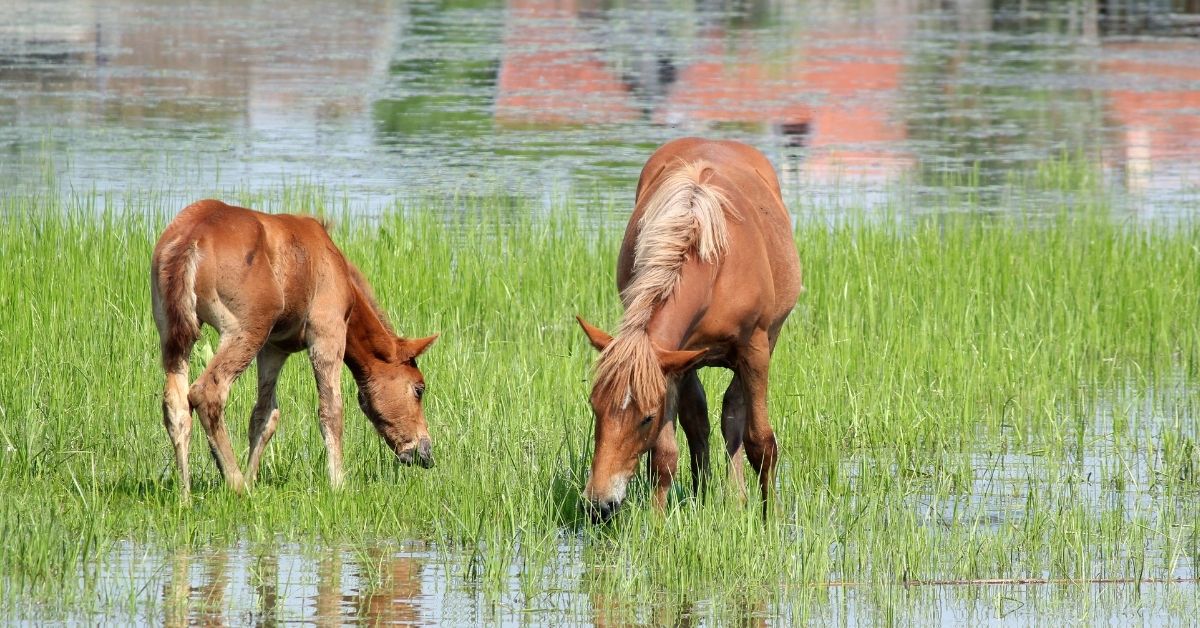
Mare and Lactation
Lactation among mares results in significant water loss. The amount of milk production varies among mares. But the average daily production is 2% or 3% of their weight.
In exchange for milk, you have to increase the water intake of lactating mares by 50% to 75%. They also need more food. Hence, you shouldn’t ignore the more supply of water to prevent any digestive issues.
Underlying Health Issues
Horses with diarrhea and chronic kidney disease should drink more water. Due to their condition, water losses are higher than the healthier ones. The extra amount of water can induce recovery and better life quality.
How Long Can a Horse Go Without Water
A horse can go without water for two days. Be aware that it can perish in 3 to 6 days without water intake.
What Are The Signs Of Dehydration?
Some horse owners need to see the importance of having horses drink enough water. They may need to be more hands-on with feeding and filling the water trough.
There’s an advantage if you’re someone who spares time to feed and give horse drinking water. It’s easy peasy for you to detect these signs of dehydration.
- Dry skin and mouth
- Sunken eyes
- Abnormal production of thick saliva
- Weakness and depression
Apart from these signs, you can let an expert confirm the case. A veterinarian can run a test for protein level. A high protein level in the horse’s blood confirms that it struggles from dehydration.
Before you see the vet, you can do a dehydration test. It’s by pinching the horse’s skin. After you do it, the skin should return to its normal state if there’s no issue with hydration. But I still recommend seeing a veterinarian once you see the abovementioned signs.
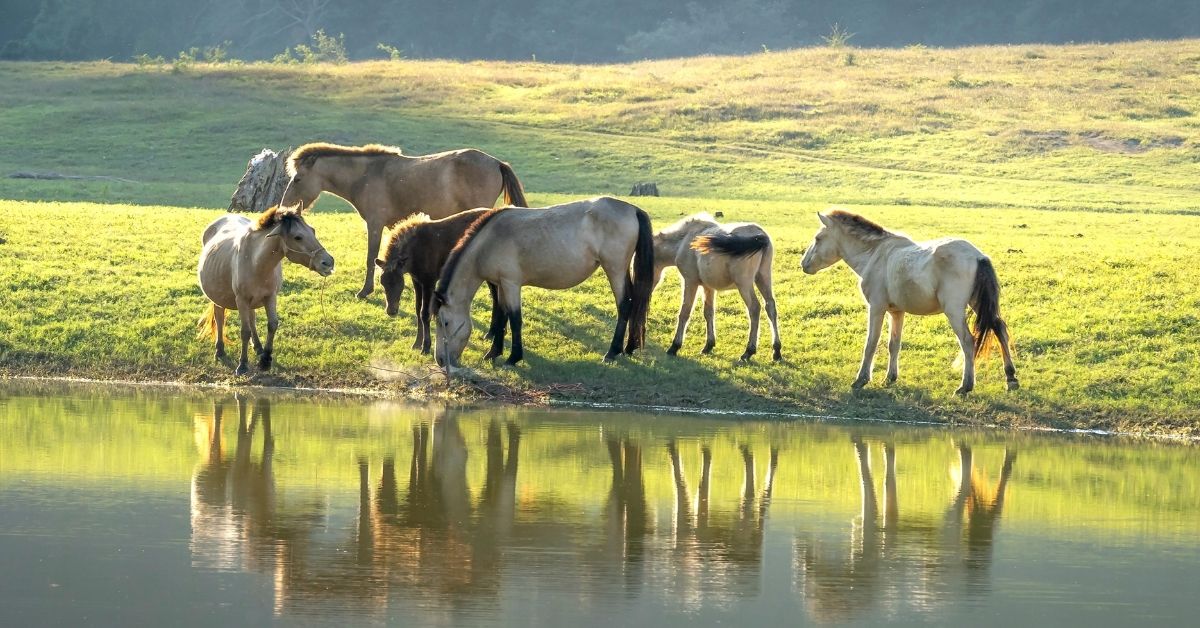
What Do I Do If My Horse Becomes Dehydrated?
You can’t force your horse to dip its head into the trough to get water. You have to encourage the animal to drink the water that it needs. Here are some techniques so your horses won’t be at risk of dehydration.
Always Serve Fresh, Clean Water!
Never give your horse dirty and contaminated water, which they won’t drink. Since this animal has a sensitive digestive system, unclean water poses health risks.
Equines are not like other animals that can vomit. Once they drink or ingest something, they can’t expel it, including liquid. When they drink contaminated water, it goes straight to their stomach and gut.
The good news is that horses can detect if they’re about to drink unclean water. Hence, they can refuse it. A horse may sip once or twice and then realize the contamination. It will refrain from drinking even if it’s dehydrated.
Sticking With the Same Water Source
I must admit that I once failed to provide the same water source. My horses could differentiate water quality. So, they refused to drink the new water supply.
From then on, I stick with the same water source so horses will succeed in meeting their hydration needs. This aspect is a challenge when you travel with your horses.
Be patient to prepare and take along the same water. It’s worthwhile for the sake of your horse’s health. Learn a tip to ease the burden of bringing water when traveling with your horses.
If you let them drink different water, add molasses to hide the new taste. You may lessen the amount of molasses you add as your horses learn to adapt to the new water.
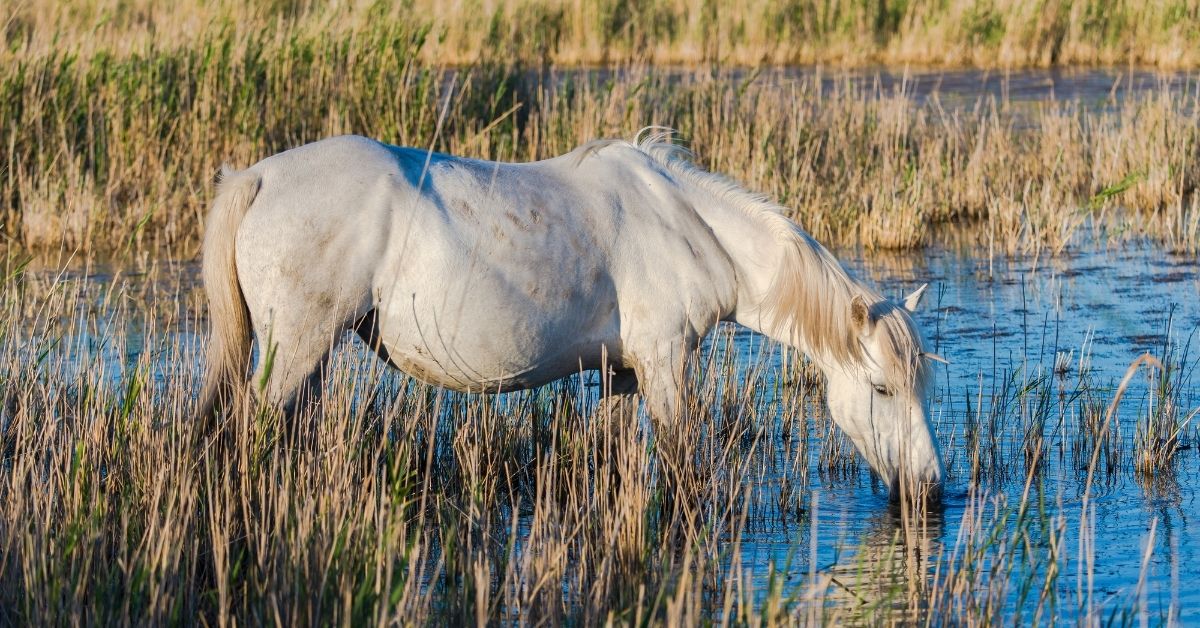
Water additives
The production of these additives intends to encourage horses to drink. To make them appealing to the equines, feed ingredients are their components.
Some water additives have electrolytes. You should know that horses that sweat a lot need electrolytes. It’s another advantage when you put additives in horse water.
How to keep horse water from freezing?
You have to keep the water easy to drink for horses. Older horses will especially not drink cold water. See to it that you check the water for your horses twice a day. Horses prefer drinking water at the temperature of 45 to 65 degrees Fahrenheit.
Here are some tips on how you can keep water from freezing.
Sun exposure
Place the water trough in a way it’s exposed to sunlight. What if you’re located in the Northern hemisphere, where seeing the sunlight is a rare chance? You have to choose the south-facing area during daytime hours.
Insulation
Even without electricity, you can insulate the trough. You can get foil or Styrofoam board for insulation. You may wrap either of these things around one trough.
But there’s a better technique; you can put a smaller trough in a bigger one with a couple of inches gap. Place insulation around the smaller trough. Then, you can spray insulation that hardens within the gap between the two troughs.
You can cover the trough with a plywood lid. Make sure that there’s insulation around its underside. Some people use passive solar heating to counter freezing. Doing this can increase the temperature by 10 degrees Fahrenheit.
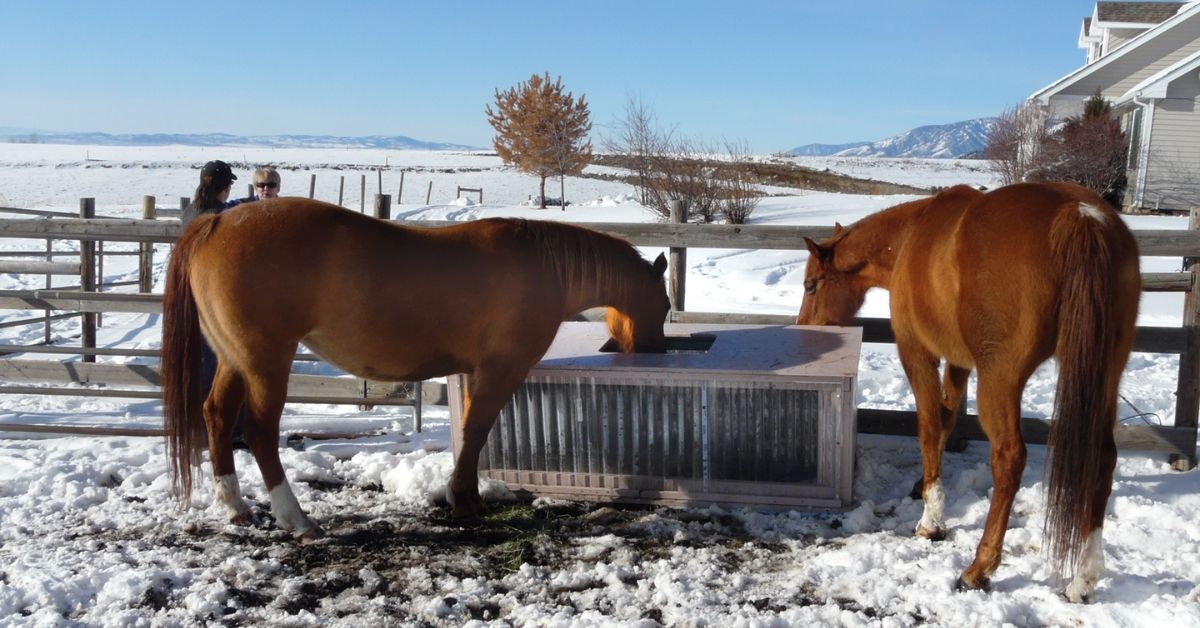
A float in the trough
There are several reasons why a float can stop water from freezing. The water doesn’t have a chance to freeze as the float moves up and down. Horses may also learn how to tap the float. It exposes an area where they can drink.
You may create a float with a 2-liter soda bottle. Fill the bottle with two-thirds water and 1 or 2 cups of salt. Ensure the bottle is tight and has enough air inside to float.
Bury the trough
You can still dig and make a hole even if you have frozen ground. Burying the trough is another way of establishing insulation.
The depth of the hole depends on your location. For example, a horse owner in South Dakota dug a hole that was 12-inch deep. It’s enough to keep the water in the trough from freezing.
Heating
You can heat the trough through the heater, electricity, battery, and propane. Apart from these things, you can generate heat by putting manure below the trough. You have to put manure several inches thick, which will break down and create heat.
Think about safety when you use electricity, battery, and propane for heating. Take note of the manufacturer’s instructions. Arrange the cables in order, and don’t let them get near the water. Placing a lid on the trough is another way to prevent water from freezing.
Why can’t horses drink river water?
Horses can’t drink river water because of the unpleasant smell and taste. There are toxic substances too. An example is cyanobacteria or blue-green algae. It’s poisonous and can harm a horse’s delicate digestive system.
How to keep a horse trough clean?
You will need a scrub brush, and pliers to unplug the trough’s drain for cleaning. After you drain the remaining water in the trough, scrub the inner part to get rid of dirt and grime. You may also do it while you drain the water from the trough.
The purpose of scrubbing is to ensure that no dirt or algae may remain in the trough. Then, you can fill it with fresh water!
Why is my horse not drinking water?
A horse won’t drink water when there’s something off with the water and trough. It happens when the water is dirty and with an unfamiliar smell. A high amount of fluoride in the water can make the horse lose interest in drinking water.
Conclusion
Like hay and grain, water is essential to horses. Food intake travels in the digestive system because of water. The same goes for nutrient distribution in a horse’s whole body. Water also helps with the excretion of horse manure.
It’s also the key to regulating body temperature. So, do your best to make your horse drink and meet the required daily amount of water. It’s a way not to encourage digestive issues.
